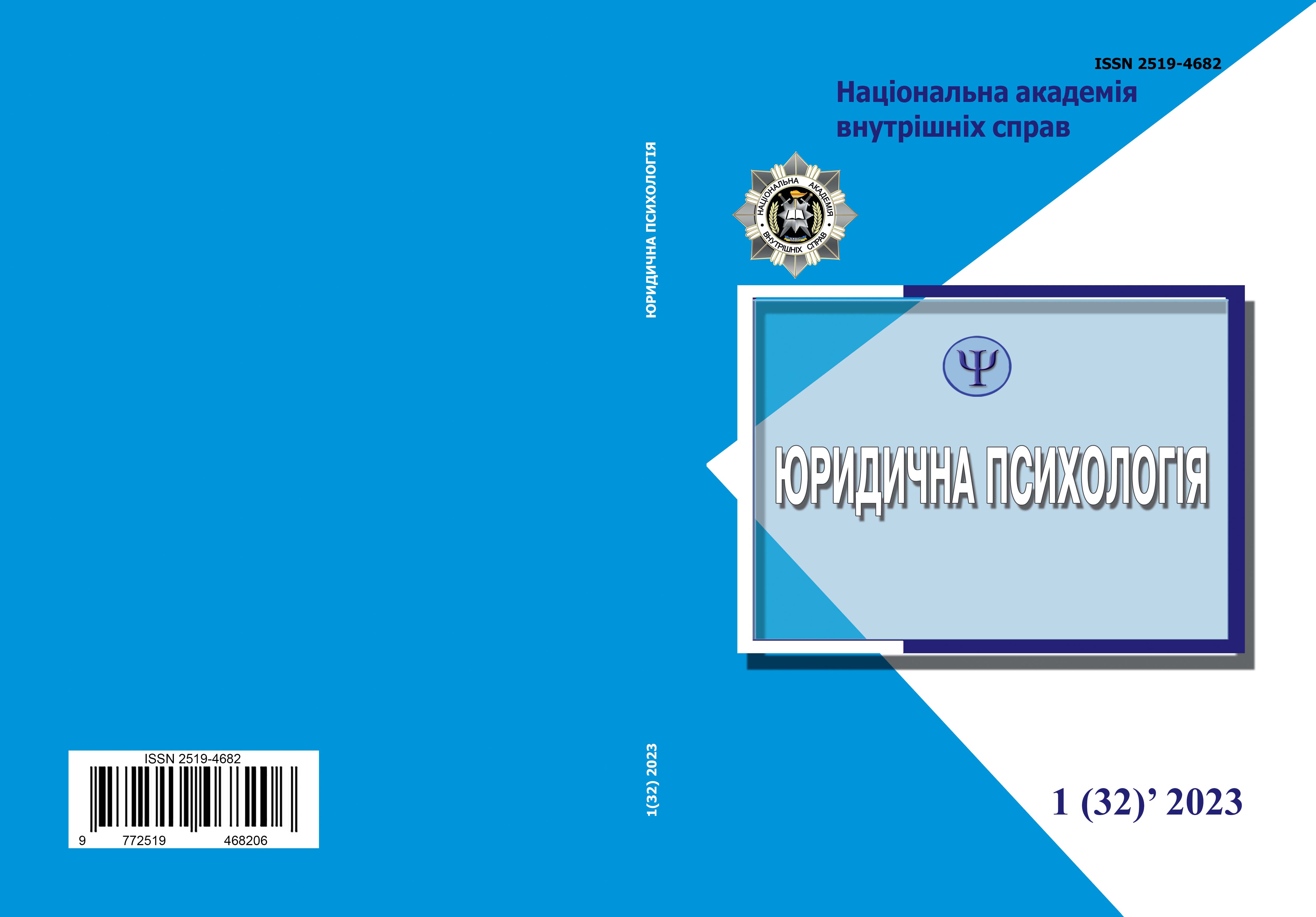Organizational and Tactical and Psychological Fundamentals Conduct of Forensic art Examinations in Criminal Proceedings
Abstract
Abstract. The activity of investigating criminal offenses, in particular in the field of encroachment on objects of cultural heritage, cultural values, etc., requires recourse to special knowledge, in particular in the form of conducting expert research, which in turn contributes to the knowledge of the event of a criminal offense, establishing the circumstances of its commission, damages caused by the criminal actions of the offender, as well as material and moral damage caused to the victim. At the same time, in the course of conducting examinations in criminal proceedings, their proper organization is important, which provides for a specific sequence of actions of those authorized to appoint and conduct forensic examinations of subjects. This necessitates a thorough study, which in turn is the purpose of a scientific article. The scientific novelty consists in elucidating the organizational and tactical-psychological principles of conducting forensic art examinations in criminal proceedings. It was established that the organizational aspect of the appointment of a forensic art examination involves a set of actions of the investigator, inquirer, prosecutor, as the subject of initiation of expert research, namely: the choice of an expert institution in which the examination will be conducted or an expert for the appointment of a forensic art examination; definition of the object and task of the research; posing questions of the exercise and drawing up a resolution on its appointment; consultation with an expert conducting expert research; assessment of the correctness of drawing up the expert's opinion. It has been established that the conduct of a forensic art examination by its nature and content is a rather complex process, during which the investigator, inquirer, prosecutor must constantly interact with an expert institution or a specific expert who will conduct an expert investigation
Keywords: investigation organization; forensic examination; forensic art examination; cultural values; works of art; tactics; criminal proceedings
Downloads
References
Чернявский С. С. Организация расследования преступлений в контексте предмета криминалистики. Сучасні проблеми криміналістики : матеріали Міжнар. наук.-практ конф., присвяч. 100-річчю з дня народж. д.ю.н., проф. В. П. Колмакова. Одеса : Юрид. літ., 2013. С. 338–341.
Чорноус Ю. М. Криміналістичне забезпечення кримінального провадження. Криміналістичний вісник. 2014. № 1 (21). С. 32–37.
Дуфенюк О. М. Забезпечення судово-експертної діяльності у кримінальному провадженні: системна парадигма. Вісник Львівського торговельно-економічного університету. 2019. Вип. 8. С. 163–173. (Серія «Юридичні науки»). doi: 10.36477/2616-7611-2019-08-18
Головченко Л. М. Проблемні питання законодавчого регулювання судово-експертної діяльності. Бюлетень Міністерства юстиції України. 2013. № 1. С. 8–10. URL: http://nbuv.gov.ua/UJRN/bmju_2013_1_4
Кримінальне процесуальне право України : навч. посіб. / за ред. В. Г. Гончаренко, В. А. Колесника. Київ : Юстініан, 2014. 573 с.
Кримінальний процесуальний кодекс України. Науково-практичний коментар / за заг. ред. В. Г. Гончаренка, В. Т. Нора, М. Є. Шумила. Київ : Юстініан, 2012. 1224 с.
Каліновська А. Оцінка доказів у кримінальному провадженні на стадії досудового розслідування. Підприємництво, господарство і право. 2019. № 11. С. 323–328. doi: 10.32849/2663-5313/2019.11.55
Каткова Т. Г., Каткова Т. В. Особливості розслідування злочинів, пов’язаних із посяганнями на культурну спадщину : практ. посіб. Харків : Право, 2011. 240 с.
Ходченко І. Л. Теоретичні аспекти судової мистецтвознавчої експертизи. Криміналістика і судова експертиза. 2016. Вип. 62. С. 460–465.
Клименко Н. І. Поняття та завдання загальної теорії судової експертології в системі юридичних наук. Криміналістика і судова експертиза. 2019. Вип. 64. С. 48–57. doi: 10.33994/kndise.2019.64.02
Кофанова О. С. Правові підстави та особливості призначення судових експертиз для дослідження культурних цінностей. Адвокат. 2010. № 9. С. 38–42. URL: http://nbuv.gov.ua/UJRN/adv_2010_9_6
Кофанова О. С. Теоретичні та практичні аспекти використання спеціальних знань при розслідуванні злочинних посягань на культурні цінності : автореф. дис. … канд. юрид. наук : 12.00.09. Київ, 2011. 18 с.
Колесник Ю. В. Слідчі та негласні слідчі (розшукові) дії як криміналістичні засоби діяльності слідчого в досудовому розслідуванні : дис.. … канд. юрид. наук : 12.00.09. Київ, 2016. 198 с.
Корж В. П. Оцінка висновку експерта: процесуальні підстави, криміналістичні рекомендації. Сучасні тенденції розвитку криміналістики та кримінального процесу в умовах воєнного стану. Харків, 2022. С. 229–232. URL: https://dspace.univd.edu.ua/server/api/core/bitstreams/ 88d8aaa1-e4fe-4ebb-9d37-74b8722e0c44/content
Нарожна О. В. Проведення експертизи нотної літератури при розслідуванні правопорушень, пов’язаних із посяганням на культурні цінності. Правова держава. 2021. № 44. С. 119–124. doi: 10.18524/2411-2054.2021.44.245086
Реєстр методик проведення судових експертиз Міністерства юстиції України : [сайт]. URL: http://rmpse.minjust.gov.ua/search.
Пучко Д. В. Належність і допустимість висновку експерта як критерії оцінювання судової експертизи. Теорія та практика судової експертизи і криміналістики. 2020. Вип. 22.
C. 226–239. doi: 10.32353/khrife.2.2020.17
Щербаковский М. Г. Компетенция и компетентность судебного эксперта. Криминалистика и судебная экспертиза. 2013. Вып. 58. Ч. 2. С. 95–104.
Шарай Є. В. Психологічні основи залучення працівників Експертної служби МВС України до досудового розслідування. Юридична психологія. 2022. № 1 (30). С. 103–108. doi: 10.33270/03223001.103
Криміналістика. Академічний курс : підручник / [Т. В. Варфоломеєва, В. Г. Гончаренко, В. І. Бояров та ін.]. Київ : Юрінком Інтер, 2011. 504 с.
Abstract views: 120 PDF Downloads: 87
- Authors reserve the right to authorship of their own work and transfer to the magazine the right of the first publication of this work under the terms of the Creative Commons Attribution License, which allows other persons to freely distribute published work with mandatory reference to authors of the original work and the first publication of an article in this magazine.
- Authors have the right to enter into separate additional agreements on non-exclusive dissemination of the work in the form in which it was published in the journal (for example, to post an article in the institution's repository or to publish as part of a monograph), provided that the link to the first publication of the work in this journal is maintained.
- The journal's policy allows and encourages the posting of articles by authors on the Internet (for example, in electronic storehouses of institutions or on personal websites), both before the submission of this manuscript to the editorial office and during its editorial processing, as this contributes to the creation of a productive scientific discussion and positively affects the efficiency and dynamics of citing the published work.




